

(Original Review, 1980-09-29)
League for the purity of what?
An admittedly less-than-thorough examination of Lessing's work leads me to conclude that her primary faults are bad (i.e., clumsy, awkward, [difficult without the extra levels that make Joyce, etc. difficult]) writing, excessive moralizing, and trite plotting with no refreshing elements (SHIKASTA in particular strongly resembles what Bova called the "tomato surprise story"). On the other hand, I admit that I've never been very impressed with Stapledon, either; I'll acknowledge that this may be a matter of taste while observing that various mundane reviewers also seem unimpressed with the Canopus Archives. In fact, I expect that most "hardcore SF fans" (however few of them are left) will simply ignore Lessing.
This review was changed from 2 stars (1980) to 5 stars (1993).
If you're into stuff like this, you can read the full review.
Every year, I like to set a few reading goals for myself: number of books, specific titles, and so forth. Because my whims change with the days and new books always catch my attention, I have yet to have one year where I complete my intended goals. So, I've decided that this year I'm going to keep it simple. I intend to read less, to slow down and really focus on and enjoy what I'm reading.
...But I love lists too much. And I cannot resist the urge to make a list of books I “will” complete this year. It's a practice I began in 2012—to identify ten books that will be read by the end of the year. Guess what? I've never read all ten in a year. I still have four holdouts from 2017, plus two others from farther back. So my only concrete goal this year is to complete my 2018 list in its entirety and to read the books from prior years. Other than that, my only goal is to enjoy what I'm reading. I'll set a reading challenge of so many books like I always do, but I'll keep it low so I don't become consumed with it.
So what will I be reading in 2018? These are the ten books that I am committing to. I think I'll be able to complete my challenge this year, assuming the world doesn't go up in smoke first. This year's list has more non-fiction than any prior list because I've had a desire to read more non-fiction lately. I mostly read fiction and I'd like to branch out some.

The Bone People by Keri Hulme
My interest in New Zealand and its literature goes back many years. I've made it a point to read more works by New Zealanders, but despite good intentions, I have avoided this Man Booker winner. I'm expecting good things from this one.
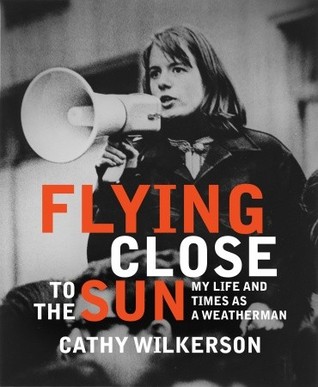 Flying Close to the Sun: My Life and Times as a Weatherman by Cathy Wilkerson
Flying Close to the Sun: My Life and Times as a Weatherman by Cathy Wilkerson
In undergrad, I watched the documentary about The Weatherman Organization and was very intrigued. I told myself I'd learn more about them and would possibly write a novel focused on them. I've been saving these Weatherman memoirs until I began researching for that novel, but now I'm not sure I'll ever tackle that project. Project or no project, I've decided to stop putting it off.

The Grass is Singing by Doris Lessing
I really want to like Doris Lessing, but my first and only experience with her so far (The Cleft) was so off-putting that I've avoided her for more than a decade. I never want to judge any author by one book, so I'm making a point to read her debut novel in 2018. I'm hoping for better results.
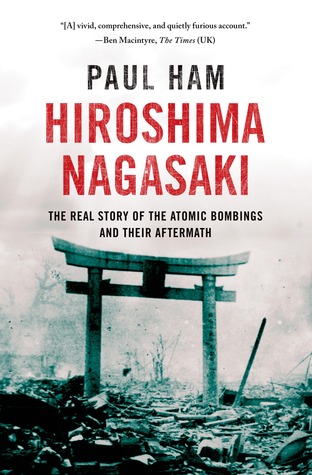 Hiroshima Nagasaki: The Real Story of the Atomic Bombings and Their Aftermath by Paul Ham
Hiroshima Nagasaki: The Real Story of the Atomic Bombings and Their Aftermath by Paul Ham
I have a strong interest in the WWII destruction of Japan, particularly the atomic bombings of Hiroshima and Nagasaki. I've read some of these historical accounts before and will likely come across much of the same information in this large volume, but it's time to brush up on the subject.
 Leaving Orbit: Notes from the Last Days of American Spaceflight by Margaret Lazarus Dean
Leaving Orbit: Notes from the Last Days of American Spaceflight by Margaret Lazarus Dean
Dean's previous work was a novel about a girl's obsession with spaceflight during the days surrounding the Challenger disaster. Her second book is this exploration of the rise and fall of NASA. I've had this one on the top of my to-read pile since its publication in 2015, but haven't made time for it.
 Not Without Laughter by Langston Hughes
Not Without Laughter by Langston Hughes
Langston Hughes is one of the more notable authors to have resided in my part of the world. I've always had the best intentions of reading local authors, especially those who were pioneers and helped shape the way for others, but I've never read more than the occasional poem by Hughes.
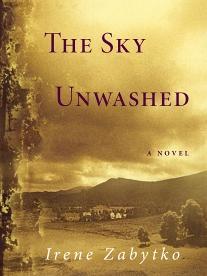 The Sky Unwashed by Irene Zabytko
The Sky Unwashed by Irene Zabytko
When I first started working at the library more than ten years ago, I saw this book on the shelf and was attracted to its sepia cover, its gorgeous title, and its intriguing description. It was one of the very first books to be added to my to-read list at my new job. Ten years later I still work at the library and I still haven't read this short novel about the Chernobyl accident.
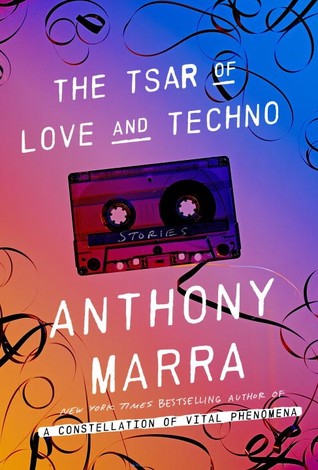 The Tsar of Love and Techno by Anthony Marra
The Tsar of Love and Techno by Anthony Marra
We loved A Constellation of Vital Phenomena, didn't we? Yet I, like many readers apparently, did not transition well to Marra's follow up two years later, this collection of short stories. Even though I absolutely loved his debut novel, I just wasn't interested in this volume. Adding it to my list will force my hand, I figure.
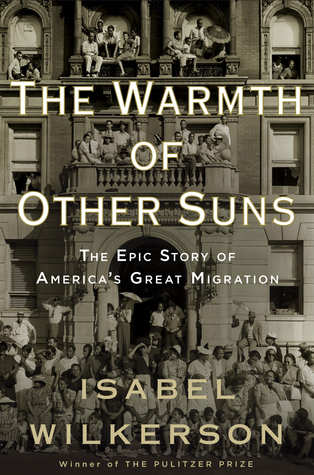 The Warmth of Other Suns: The Epic Story of America's Great Migration by Isabel Wilkerson
The Warmth of Other Suns: The Epic Story of America's Great Migration by Isabel Wilkerson
There's been so much praise heaped on this book. It's time I give this historical gem a try.
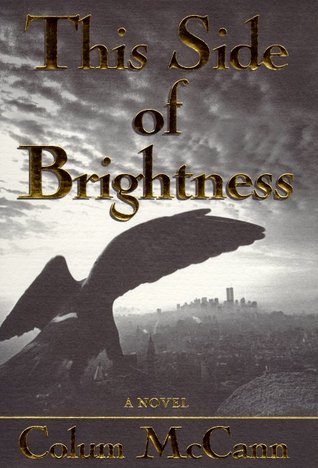 This Side of Brightness by Colum McCann
This Side of Brightness by Colum McCann
Last year, I read and absolutely loved McCann's Letters to a Young Writer. I'd spent some time with the author previously, but it was this slim volume about writing that made a big fan out of me. I told myself I'd make it a point to return to the author as soon as possible. And I figured I might as well start with the novel that launched his career.
And my unfinished books from prior years:
The Counterfeiters by Andre Gide
The Deptford Trilogy by Robertson Davies
Demons by Fyodor Dostoyevsky
Mama Day by Gloria Naylor
Union Dues by John Sayles
Weeds by Edith Summers Kelley
Seeing all sixteen of these listed, I'm already feeling overwhelmed. I've learned the key to completing my list is to not put off the list to the middle of the year. I really need to be checking off one or two of these titles every month. Intention set.
While I'm making an already long post longer, here are some of the top titles, old and new, I hope to get around to in 2018: The Temple of the Dawn by Yukio Mishima, The History of Love by Nicole Krauss, Birnam Wood by Eleanor Catton, Erasure by Percival Everett, The Road Through the Wall by Shirley Jackson, An American Marriage by Tayari Jones, An Artist of the Floating World by Kazuo Ishiguro, Winter by Ali Smith, Parnucklian for Chocolate by B.H. James, 1996 by Gloria Naylor, Hot Pink by Adam Levin, and... I can keep going forever. See how I get myself in trouble?
Do you set reading goals for your year? Do you find it helpful to do so, or imposing? What do you look forward to reading in 2018?

Meh! und Wäh!
Was hat die Kritikerin der WELT über dieses Buch geschrieben? "Die gute Terroristin ist eine dramatische und literarisch aufregende Mischung aus Thriller, Gesellschaftsroman, Zeitgemälde und einem glühenden Plädoyer, dem Terror endlich eine endgültige Absage zu erteilen."
Meine Meinung: Ein sprödes langweiliges nichtssagendes Werk in dem gehirntote gelangweilte Kinder der Oberschicht mit einem ausreichenden sozialen Netz a bissi rebellieren, Kommunismus und Arbeiterklasse spielen, alle verachten (auch jene Arbeiter, für die sie zu kämpfen vorgeben), blöde Parolen von Faschisten und Klassenkampf klopfen, die Eltern beklauen, demonstrieren, a bissi dilletantisch Bombenattentate ausführen... usw. usf. Die paar authentischen wirklichen arbeitslosen Hausbesetzer aus der Unterschicht werden eh an den Rand gedrängt, ausgenutzt und wenn sie abkratzen, zuckt man noch kurz mit den Schultern, schüttelt sich ab und macht mir der gaar so wichtigen Revolution weiter. Die meisten Figuren sind völlig ambivalent wie die Protagonistin Alice. Die Gute Terroristin ist kein Oxymoron, sondern die Hausbesetzerin ist wirklich so. Einerseits organisiert repariert kocht & putzt sie im besetzten Haus, um es für die sehr peinliche Revolutionsnachhilfegruppe zu Muttis Wohlfühlhöhle zu machen, andererseits verabscheut sie Spießertum und badet in langweiligen revolutionären Parolen.
Dabei muss ich bezüglich meiner Bewertung sagen, unsymphatische Figuren machen mir gar nichts aus, aber wenn sie derart gähnend langweilig beschrieben sind, dann muss ich die Autorin abstrafen. Da wird doch tatsächlich raumgreifend ständig thematisiert ob man nun Kummerl nach UDSSR Ausrichtung, Trotzkist, IRA oder sonstwas ist und das nicht so kurz, knackig und witzig wie bei Monty Phytons konspirativen Treffen nach dem Circus im Rom mit der judäischen Volksfront bzw. der Volksfront von Judäa, sondern den ganzen Roman immer wieder und wieder. Und was soll das mit dem Upperclass Sprachduktus, den jeder einzelne der Hausbesetzergruppe durch irgendeinen anderen Unterschicht-Dialekt zu kaschieren versucht? Ausgewalzt nicht nur auf mehreren Seiten, nein es wird immer wieder als Thema im Roman aus der Mottenkiste des bourgeoisen Grauens hervorgekramt für jeden einzelnen der Gruppe aber auch jeder Fremde wird aufgrund des Sprachduktus detailliert analysiert und taxiert. Ich weiß von der Manie der Briten mit Sprache, aber muss ich das verstehen und auch noch raumgreifend lesen. Zudem werden gefühlte 1000 Suppen gekocht und die Hausrenovierung in einem Detaillierungsgrad geschildert, der dem Film Hinterholz 8 seine Ehre gemacht hätte.
Ab der Mitte des Werkes, immer wenn mir die Autorin irgendwas politisches mitteilen will, bin ich beinahe in Narkolepsie gefallen, weil es so platt und schnarchnasig vermittelt wird. Gleich einem Leierkasten oder einer hängengebliebenen Schallplatte ewig dieselben polititschen Parolen, so kann die Revolution einfach nicht funktionieren, genausowenig wie dieser Roman, wenn sie beide so scheinheilig und total einschläfernd daherkommen. Das ist wirklich soooo *gähn*, wo die Thrillerelemente bei all dem Gekoche, Geputze, den Reparaturen dem peinlichen Spiel auf Eratzfamilie und wo das glühende Plädoyer gegen Terrorismus in diesem Buch abgeblieben sein soll, ist mir schleierhaft, ich habs mit der Lupe gesucht, und nicht gefunden.
Und dann auch noch Literaturnobelpreis? Echt jetzt? Da müssen die anderen Romane der Autorin aber wirklich um Klassen besser sein.
Fazit: 2,3 Sterne diesmal abgerundet auf 2 denn der Roman hat meine erste und ultimative Todsünde begangen, und mich gelangweilt. Geärgert hat er mich auch, aber das ist nicht so schlimm.